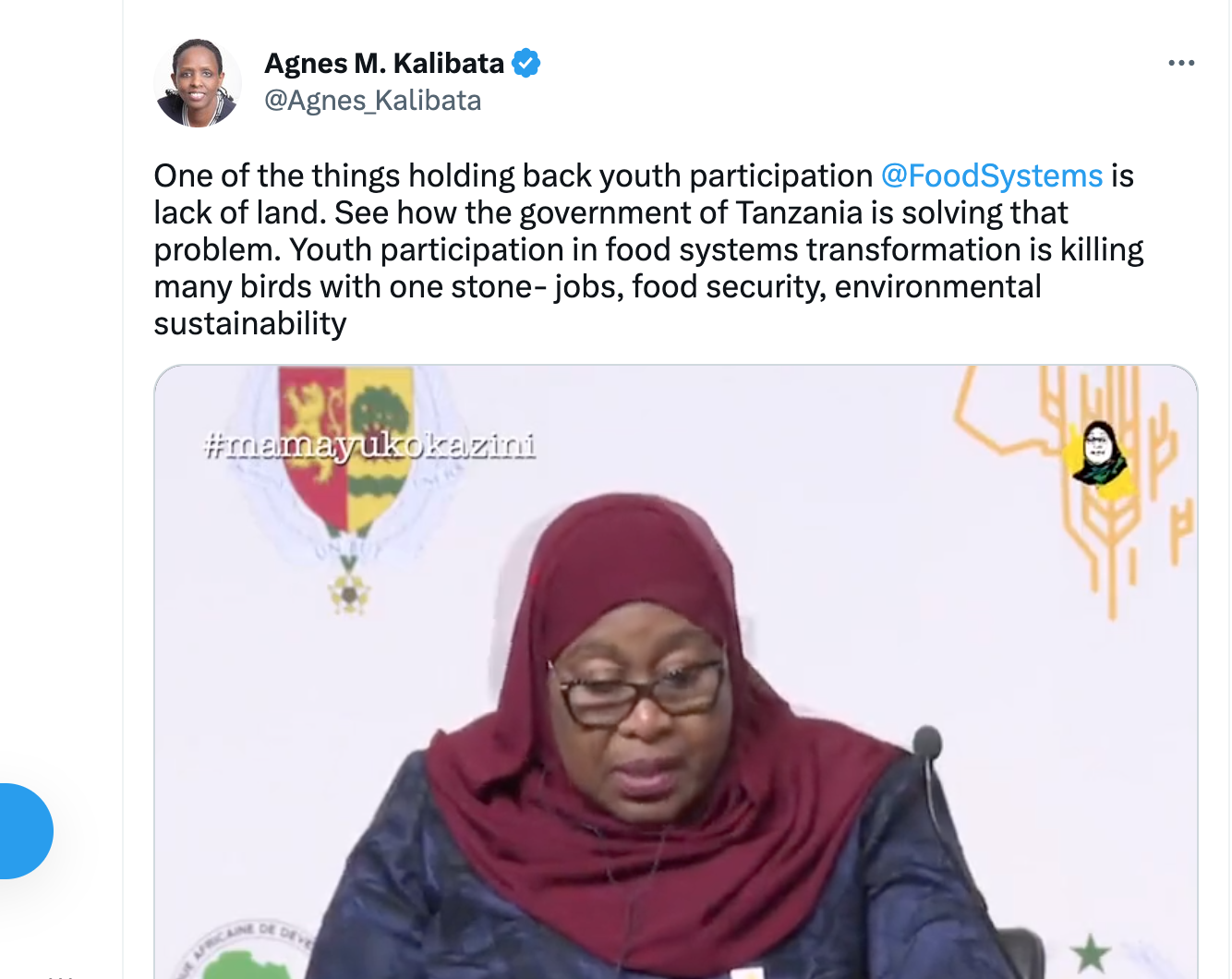
By Anthony Muchoki
Dr. Agnes M. Kalibata, President of AGRA, has commended the Tanzanian government for taking a significant step towards enabling youth to participate in food system transformation.
A strong advocate for youth empowerment in agricuture, Dr Kalibata believes that “the younger generation needs to have productive, meaningful lives. Let’s give them the technologies and opportunity to be part of growing our world.”
Tanzania’s government is giving the young generation an enticing opportunity to participate in food systems transformation. On that note, she tweeted recently, “One of the things holding back youth participation in FoodSystems is lack of land. See how the government of Tanzania is solving that problem. Youth participation in food systems transformation is killing many birds with one stone- jobs, food security, environmental sustainability.”
The “see how” video was of President Samia Suluhu Hassan explaining how Tanzania is on track to see what its youth can achieve in the agriculture sector by building their capacity and creating a conducive environment. President Samia highlighted the government’s initiatives to increase access to land for young people and create more opportunities for them to engage in agriculture and related activities. President is optimistic that Tanzania’s ongoing efforts will contribute significantly to the continent’s food security in the years ahead. “By building the capacity, providing the right environment, and creating a conducive environment. The country (Tanzania) can feed the continent,” notes President Samia.
President Samia was speaking in reference to Tanzania’s Ministry of Agriculture fronted Building a Better Tomorrow: Youth Initiative for Agribusiness (BBT-YIA) program, which provides grants and soft loans to youth and women involved in commercial crop production. The initiative is part of the Agricultural Input Trust Fund (AGITF). It addresses the challenges young people and women face in agriculture, including access to land, capital, technology, and markets.
BBT-YIA program serves youths aged 18-40 years actively engaged in an agricultural enterprise at the time of application, using either their own, their family’s, or rented land.
According to the ministry of agriculture, the BBT-YIA program aims to achieve 12,000 profitable enterprises across 12,000 villages in Tanzania over the next eight years by training 200,000 youth and involving 20,000 youth in internship programs, mentoring and coaching 15,000 youth-led agribusinesses through incubation programs.
The program is funded through a combination of government resources, development partners, NGOs, and the private sector, with the Ministry of Agriculture serving as the facilitator and coordinator. This initiative is expected to benefit significantly young people and women in Tanzania and contribute to the growth of a thriving agribusiness sector.
According to the minister of Agricuture, Hussein Bashe BBT-YIA will play a critical role in addressing the challenges faced by young people and women in agriculture and will ultimately contribute to the sustainable development of food systems and the greater good of society.
Dr. Kalibata, in 2019, commended Tanzania for taking a step forward in developing the agriculture sector, placing it ahead of some of its peers across the continent. Speaking in 2021 on the role of youth in agri systems transformation, she said: “Youth are not victims; they are participants with a strong voice that can change the trajectory of where the world is going if they put that voice stronger together.”
At AGRF 2022 Summit in Kigali, Rwanda, Dr Agnes Kalibata delivered a resounding message to attendees that investing in young people is crucial to securing Africa’s future. Dr. Kalibata emphasized that Africa cannot afford to neglect the importance of this mission to feed itself. Without investing in the youth population, Africa may risk becoming a poor continent by 2030.
